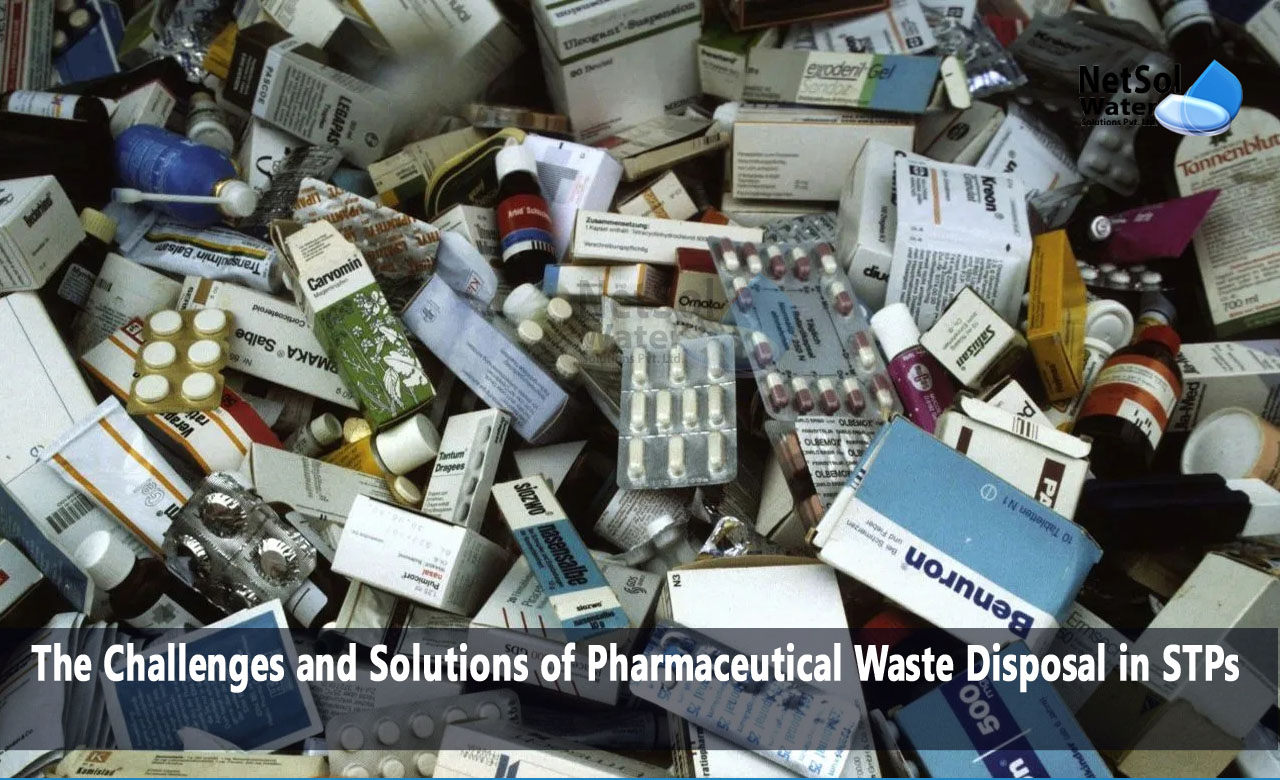The Challenges and Solutions of Pharmaceutical Waste Disposal in STPs
Pharmaceutical waste poses a significant environmental and public health challenge. Improper disposal of pharmaceuticals can lead to the contamination of water bodies and ecosystems, potentially causing adverse effects on aquatic life and even human health. Sewage treatment plants play a crucial role in managing wastewater, including the disposal of pharmaceutical waste. However, ensuring the sustainable disposal of pharmaceutical waste presents unique challenges.
In this blog, we will explore these challenges and discuss potential solutions to promote sustainable practices in sewage treatment plants.
The Challenges of Pharmaceutical Waste Disposal
- Chemical Complexity: Pharmaceuticals are designed to have specific effects on the human body, which means they often contain complex and potent chemical compounds. Treating and removing these compounds from wastewater can be challenging, as conventional treatment processes may not effectively break them down or remove them entirely.
- Persistence and Bioaccumulation: Some pharmaceuticals are persistent in the environment, meaning they can resist degradation over time. Additionally, they have the potential to bioaccumulate in aquatic organisms, leading to long-term ecological effects. Conventional sewage treatment processes may not adequately address these persistent pharmaceutical compounds.
- Limited Regulatory Guidelines: The regulations and guidelines regarding pharmaceutical waste disposal are still evolving and can vary across jurisdictions. This lack of consistent and comprehensive regulations makes it difficult for sewage treatment plants to develop and implement effective strategies for sustainable disposal.
Solutions for Sustainable Pharmaceutical Waste Disposal
- Advanced Treatment Technologies: Implementing advanced treatment technologies can enhance the removal of pharmaceutical compounds from wastewater. Advanced oxidation processes, such as ozone or ultraviolet (UV) treatment, can effectively break down complex chemicals. Membrane filtration systems, such as nanofiltration or reverse osmosis, can help in removing even trace amounts of pharmaceuticals from wastewater.
- Source Control Measures: Source control measures aim to minimize the introduction of pharmaceutical waste into the wastewater stream. This can involve promoting proper disposal practices among consumers, healthcare facilities, and pharmaceutical manufacturers. Increasing awareness about the environmental impact of pharmaceutical waste and encouraging the use of take-back programs or medication drop-off sites can help reduce the amount of pharmaceuticals entering the wastewater.
- Collaboration and Education: Collaboration among wastewater treatment facilities, pharmaceutical manufacturers, healthcare providers, and regulatory agencies is crucial to develop effective disposal strategies. This collaboration should involve sharing information, research, and best practices for sustainable pharmaceutical waste management. Educating healthcare professionals, patients, and the general public about the proper disposal of pharmaceuticals is also essential to prevent their entry into the wastewater system.
- Monitoring and Testing: Regular monitoring and testing of wastewater effluents can help identify the presence of pharmaceutical compounds and assess the effectiveness of treatment processes. This data can inform decision-making and enable sewage treatment plants to refine their treatment strategies accordingly.
- Research and Innovation: Continued research and innovation are essential to address the challenges of pharmaceutical waste disposal. This includes exploring new treatment technologies, developing more environmentally friendly pharmaceutical compounds, and establishing standardized testing methods for pharmaceutical waste identification.
Conclusion
Sustainable disposal of pharmaceutical waste is a pressing issue for sewage treatment plants. Overcoming the challenges associated with pharmaceutical waste requires a multifaceted approach that combines advanced treatment technologies, source control measures, collaboration, education, and ongoing research and innovation. By implementing these solutions, sewage treatment plants can play a crucial role in safeguarding the environment, protecting public health, and promoting sustainable practices in the management of pharmaceutical waste. Together, we can ensure a cleaner and healthier future for our water resources and ecosystems.
Netsol Water is Greater Noida-based leading water & wastewater treatment plant manufacturer. We are industry's most demanding company based on client review and work quality. We are known as best commercial RO plant manufacturers, industrial RO plant manufacturer, sewage treatment plant manufacturer, Water Softener Plant Manufacturers and effluent treatment plant manufacturers. Apart from this 24x7 customer support is our USP. Call on +91-9650608473, or write us at enquiry@netsolwater.com for any support, inquiry or product-purchase related query.



